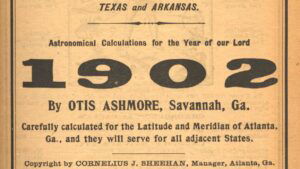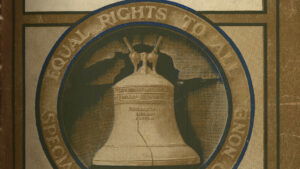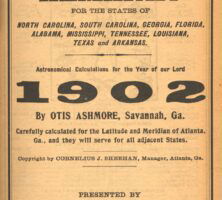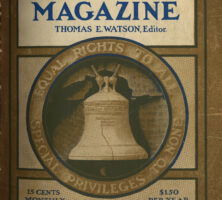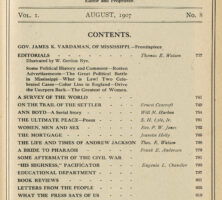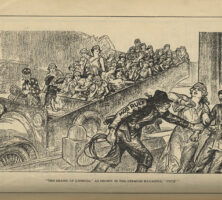The New Georgia Encyclopedia is supported by funding from A More Perfect Union, a special initiative of the National Endowment for the Humanities.
Grier's Almanac, one of Georgia's longest-running publications, was first published in 1807 and is named for amateur astronomer Robert Grier, who provided astronomical calculations for the almanac until his death in 1848. The 1902 edition was produced during the tenure of Otis Ashmore, who served as editor of the almanac from 1882 to 1934.
The New Georgia Encyclopedia does not hold the copyright for this media resource and can neither grant nor deny permission to republish or reproduce the image online or in print. Requests for permission to publish or reproduce the resource should be submitted to the Hargrett Manuscript and Rare Book Library at the University of Georgia.
This advertisement for Cheney's Expectorant appeared in the 1906 issue of Grier's Almanac, which has been published in Georgia since 1807. Advertisements for the product appeared frequently in the almanac during the late 1800s and early 1900s. In 1912 the Atlanta drug company John B. Daniel Inc., which sold the expectorant, purchased the almanac.
The New Georgia Encyclopedia does not hold the copyright for this media resource and can neither grant nor deny permission to republish or reproduce the image online or in print. Requests for permission to publish or reproduce the resource should be submitted to the Hargrett Manuscript and Rare Book Library at the University of Georgia.
Thomas E. Watson, a prominent Georgia Populist, founded Tom Watson's Magazine in 1905. The first issue of the monthly literary magazine, which featured editorials by Watson, sold more than 100,000 copies. This cover is from the September 1906 issue.
From Tom Watson's Magazine, 1906
The New Georgia Encyclopedia does not hold the copyright for this media resource and can neither grant nor deny permission to republish or reproduce the image online or in print. All requests for permission to publish or reproduce the resource must be submitted to the rights holder.
Thomas E. Watson moved the publication of Tom Watson's Magazine to Atlanta in 1906 and changed the name to Watson's Jeffersonian Magazine. In Atlanta the influence of the journal rivaled that of the Atlanta Journal and the Atlanta Constitution. This table of contents is taken from the August 1907 issue.
From Watson's Jeffersonian Magazine, 1907
The New Georgia Encyclopedia does not hold the copyright for this media resource and can neither grant nor deny permission to republish or reproduce the image online or in print. All requests for permission to publish or reproduce the resource must be submitted to the rights holder.
The frontispiece from the March 1915 issue of Watson's Jeffersonian Magazine is entitled "The Shame of Georgia" and accompanies an article called "A Full Review of the Leo Frank Case." Frank, a Jew, was convicted of killing a thirteen-year-old and hanged by a lynch mob after Georgia governor John M. Slaton commuted his death sentence to life imprisonment. Many in the Jewish community and beyond believed that anti-Semitism played a role in Frank's conviction and subsequent death.
From Watson's Jeffersonian Magazine, 1915
The New Georgia Encyclopedia does not hold the copyright for this media resource and can neither grant nor deny permission to republish or reproduce the image online or in print. All requests for permission to publish or reproduce the resource must be submitted to the rights holder.
Georgia Trend, a monthly publication founded in 1985, follows the economic and political news in the state. This October 2004 cover displays photographs from the annual "40 under 40" feature, which lists forty influential Georgians in the business and political communities who are under the age of forty.
Reprinted with permission of Georgia Trend
The New Georgia Encyclopedia does not hold the copyright for this media resource and can neither grant nor deny permission to republish or reproduce the image online or in print. All requests for permission to publish or reproduce the resource must be submitted to the rights holder.

